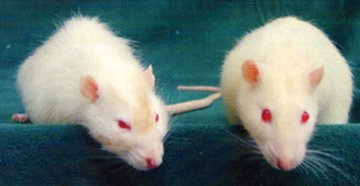Worry seems to shorten a timid rat’s life
Rats that prefer familiar settings tend to die younger than do more adventurous rats.
By Emily Sohn
Afraid to try new things? You might want to think about swallowing your fear and getting over it, if a study of rats is any indication.
Rats that prefer to surround themselves with familiar things tend to die at an earlier age than more adventurous rats do, a recent study found. If the same is true for people, being open to certain kinds of new experiences might help you live longer.
 |
|
The rat on the left shows fear and caution in a new environment while its brother (right) displays boldness and curiosity in the same setting.
|
| Sonia Cavigelli and Martha McClintock |
As babies, some rats climb all over new objects, and they tend to be just as adventurous and curious as adults. Other rats are more timid throughout their lives. In neutral situations, both curious and cautious rats have the same amount of a chemical called corticosterone in their blood. Levels of corticosterone, a hormone, rise when an animal is under lots of stress.
In one study, two psychologists from the University of Chicago looked at 14 pairs of rat brothers who were 15 months old. One brother was bold, the other timid. When restrained in a tube, the timid rats had much higher levels of corticosterone than their brothers had, the researchers found. The response lasted for more than 2 hours.
On top of that, timid rats in the study lived only about 600 days. Adventurous rats survived around 700 days.
Adventurous people might produce fewer stress hormones, too, which could help them live longer. But researchers aren’t ready to recommend that you let go of all your fears. Risky behavior can end lives before stress hormones even have a chance to make a difference.—E. Sohn
Going Deeper:
Bower, Bruce. 2003. Worried to death: Lifelong inhibitions hasten rodents’ deaths. Science News 164(Dec. 13):373. Available at http://www.sciencenews.org/20031213/fob5.asp .







